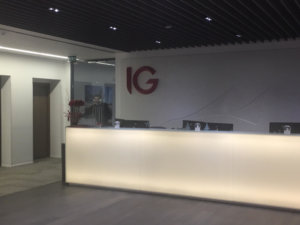Exclusive: IG Group heads back to Chicago to re-establish itself in North America’s retail FX market, applies for NFA license
IG Group is now heading back to Chicago, some six years after its exit, and has applied for Forex Firm, a Forex Dealer Member (FDM) license, an Introducing Broker license, full NFA membership and a Retail Foreign Exchange Dealer (RFED) license, with the application effective date being November 28, 2017. Here is our full analysis

It is widely recognized globally that British multi-asset retail FX & CFD trading company IG Group is a tour de force among its peers, nestling alongside the very few high quality companies that have significant presence in the retail FX sector, dominating at the very upper level, alongside CMC Markets, Saxo Bank and its very own British white label, Hargreaves Lansdown’s HL Markets, part of the country’s largest financial services company.
IG Group’s status in Britain is one of extremely good standing, the company having been established in 1974, garnering a loyal and discerning customer base in its own domestic UK market, testimony to the company’s commitment to serving a highly analytical and conservative demographic base.
By the end of last year, IG Group had achieved an annual revenue of £487.9 million, and is listed on the London Stock Exchange’s main market, having a market capitalization of £2.49 billion.
Considering the consolidation of the retail FX sector globally, largely concerning firms that have been only established since the dawn of MetaTrader 4, which gave rise to several almost identical, small firms, along with the increasing overt competition, IG stands proud, with today’s client base being represented in its own land by around 50% of global business, having managed to go from strength to strength internationally in important regions for the retail sector including Australia and the APAC region.
A steady and strong corporate progression is clear from IG Group’s continual growth, however an area which the firm has retracted from, along with many retail FX brokerages in what can only be described as a mass exodus, is the United States of America.
In 2011, just after the implementation of the Dodd-Frank Wall Street Reform Act which required various structural changes to all aspects of the financial services sector in America, and at approximately the same time at which the United States authorities implemented a minimum capital adequacy requirement for retail firms at $20 million, many companies exited the market, IG Group being one of them.
IG Group had been extremely well recognized in North America until its exit in 2011, and had benefited from some extremely strong leadership, notably that of Rod Drown, an industry figure very highly regarded by FinanceFeeds, who was CEO of IG Markets US division from 2007 until 2010.
Now, however, after almost five years of the United States retail OTC derivatives market having been dominated by just four companies, those being Interactive Brokers, OANDA Corporation, FXCM and GAIN Capital, before shrinking to just two as Interactive Brokers shifted its focus toward high net worth individuals and Eligible Contract Participant (ECP) business, and FXCM was banned from the US market by the NFA during its high profile allegations that the firm purported to provide direct market access, and reported publicly thus, was trading against its customers via a market maker (EFFEX Captial) that it had an undisclosed interest in, all is set to change.
FinanceFeeds maintained for some time that for high quality retail companies with a good approach to service and a large capital base, the US market is absolutely ready for entry, and is especially appropriate for good quality British, Australian or home grown companies.
IG Group is now heading back to Chicago, some six years after its exit, and has applied for Forex Firm, a Forex Dealer Member (FDM) license, an Introducing Broker license, full NFA membership and a Retail Foreign Exchange Dealer (RFED) license, with the application effective date being November 28, 2017.
Upon the retraction of retail FX from the United States market by IG Group in 2011, the company maintained a presence there, in the form of NADEX, one of the nation’s only two exchange-listed binary options venues, which has its head quarters in Chicago, and with the company’s recent application for full NFA membership as an FX brokerage, a return in its full form is most certainly on the cards.
Continuity was most certainly abound as Dan Cook, CEO of IG Group in North America between 2008 and 2011 (whereas Rod Drown was CEO of IG Markets US), became Director of Business Development at NADEX in June 2011, just after IG’s exit from the retail FX market, and remains in that position today, at the firm’s Chicago operations.
Congruent to the application to the National Futures Association (NFA) for RFED, FDM and brokerage licenses in North America, the company has registered with the CFTC on the CFTC’s Directory of CFTC Registrants and NFA Members, with the status showing as ‘Pending’.
FinanceFeeds considers this to be an excellent move, and an advantage for US customers, themselves very discerning, having much larger average deposits than other parts of the world ($6600 in the US compared to $3800 globally), much longer lifetime values, and more diversified product portfolios.
Here is FinanceFeeds’ perspective on why entering the US market is a good move for quality, established companies.
On the CFTC register, IG Group’s application pending status can be viewed by clicking here, then navigating to the “Directory of CFTC Registrants and NFA Members” section, and then scrolling down to column L.
Those wishing to meet FinanceFeeds in Chicago between February 6 and February 9 2018, please contact [email protected] to arrange an appointment.









